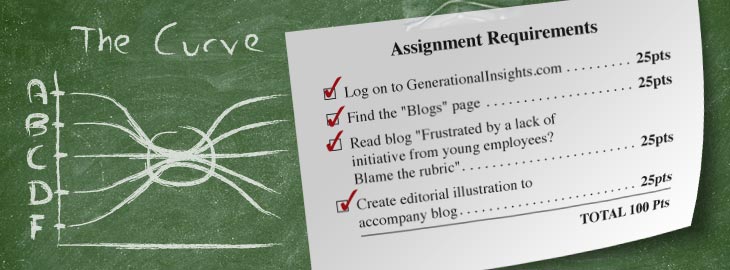Today’s iGen teenagers may be better equipped for the world than we think
Posted On January 7, 2019
You’ve seen the students from Florida’s Marjory Stoneman Douglas High on TV since the terrible shooting at their school last spring. Regardless of what you think of the stance they’ve taken on gun control, it’s difficult not to admire the initiative these teenagers have shown in organizing the #NeverAgain movement and the way they’ve handled themselves in the face of harsh criticism after placing themselves in the public eye. Is this what we expected from iGen? Weren’t they supposed to be an even more entitled, self-absorbed bunch of social media addicts than we perceive millennials to be? A recent article… Read More
Categories: Blog, iGenWe’ve seen the millennial office, but what will an iGen workspace look like?
Posted On November 26, 2018
We’ve spent a good bit of time in this space discussing the aspects of a millennial workspace. But perhaps, with iGen now starting to enter the workforce, we should consider what they will want in an office as well. Beatriz Sanchez, a contributor at globalfurnituregroup.com, did just that recently, and the picture she paints is quite a bit different from the trends we’re seeing now. Instead of the open, collaborative spaces millennials crave, iGen employees are looking for predictability and structure, Sanchez says; they’re independent and like to have their own workspaces. They prefer face-to-face communication to the email and… Read More
Categories: Generation Y / Millennials, iGen, WorkplaceIs iGen the “first truly post-Christian generation?”
Posted On February 8, 2018
It’s been 136 years since Friedrich Nietzche declared that “God is dead.” Despite the revelations of the Enlightenment, however, Christianity, Judaism, Islam and other forms of religion have survived and prospered around the world. Now, over a century later, one study suggests iGen may be looking to finish the job. In a recent study by Barna Group, 13 percent of iGen respondents (or Generation Z, as Barna calls them) identified themselves as atheists, a percentage double that of the U.S. adult population. That led Barna to refer to iGen as “the first truly post-Christian generation.” Thirteen percent is less than… Read More
Categories: iGenI Don’t Want to Grow Up, I’m an iGen Kid
Posted On October 6, 2017
So it appears today’s teens are doing less. According to various studies and surveys, fewer of them are driving or working part-time jobs. Are they just lazy? Fewer of them are drinking, having sex or getting pregnant. Are they more responsible than previous generations at that age? In a recent piece for CNN, San Diego State psychology professor Jean Twenge proposes another theory: iGen is just taking longer to grow up. Twenge contends that how quickly teenagers grow up – or take more interest in doing things adults are supposed to do – is dependent upon what’s happening culturally at… Read More
Categories: iGen, ParentingiGen wants, more than anything, to be unique.
Posted On June 12, 2017
We’re all concerned about finding out what millennials want, and with good reason. They are the largest segment of the workforce and the largest segment of consumers. But it would also be wise to have an eye focused on what’s coming behind them. Some call them Generation Z, or iGen, while Skyler Huff of millennialmarketing.com calls today’s teenagers the Pivotal Generation. They share the technological savvy and many of the forward-thinking views of millennials, Huff says, but they also pivot toward many of the same traditional values as Baby Boomers. Generation Z – or Pivotals, if you will – want… Read More
Categories: iGeniGen, Education Trends, & and the Changing World of Work
Posted On December 6, 2016
(Today’s blog comes from our go-to demographer Gerald Bierling. I’ve asked Gerald to gather content on the generation following the Millennials – often called the Plurals or Gen Z, I prefer the term iGen – and afterwards, summarize some of it regarding the workplace.) by Gerald Bierling A lot is being written about the changing world of work and the difficulties the next few generations of Americans will have finding employment. Much of it focuses on the potential loss of jobs due to computerization. Researchers out of Oxford University, for example, estimate that up to 47% of US employment is… Read More
Categories: iGen, Work, Workplace“Stop doing their homework.”
Posted On November 24, 2015
I was reading a Washington Post piece recently about helicopter parenting recently when a line in the story stopped me in my tracks. At the end of a short list of easy-to-use tests to determine whether you are a helicopter parent was the admonition: “Stop doing their homework.” Parents are doing their kids’ homework? Where were these parents when I was in middle school? As crazy as that sounds, we all know parents nowadays who coddle their children, who hold their hands through every challenge, who refuse to let them fail. And yes, some of them probably do their homework… Read More
Categories: Generation Y / Millennials, iGenDon’t look now, Generation Z is coming
Posted On January 29, 2015
Just when you think you’ve figured out how to handle the shifting perspectives and expectations of the Millennials (aka Generation Y), the next generation is nipping at their heels. The good news for most employers is that they aren’t quite ready to enter the workforce, but they are becoming a force on the consumer front, so if you pay attention, you may be better prepared when their resumes start landing in your inbox. Advertising Age has done a good job of providing an early profile of Gen Z, focusing on this consumer mindset. When reading through the traits they ascribe… Read More
Categories: iGenIs Generation Z bigotry-proof?
Posted On January 8, 2015
Youthful idealism. Every generation has been accused of it, but a recent commentary by Bloomsberg View contributor Leonid Bershidsky suggests that for Generation Z (or iGeneration – born after 2000) this may be a lasting state. He writes “Gen Z may be different in being genuinely bigotry-proof. It may be the first generation for which diversity is a natural concept that will not be ruined by anything older people do or say.” This is not the main point in Bershidsky’s article, but it is what stood out when I heard him read it. Considering the younger generations’ views on gender… Read More
Categories: Generations, iGenFrustrated by a lack of initiative from young employees? Blame the rubric.
Posted On August 12, 2014
One of the recurring themes in my discussions about working with Millennials is that you can’t hold them accountable for what they don’t know they should do. And one of the frequent counterarguments is that they need to think for themselves, show a little initiative. A college professor recently shared this article with me, which may shed some light on how your young employees came to be so dependent on being given very clear expectations: the rubric. If you have school-age children, chances are you’ve seen a rubric – it’s basically a checklist of assignment requirements, including how many points… Read More
Categories: iGen, Parenting







